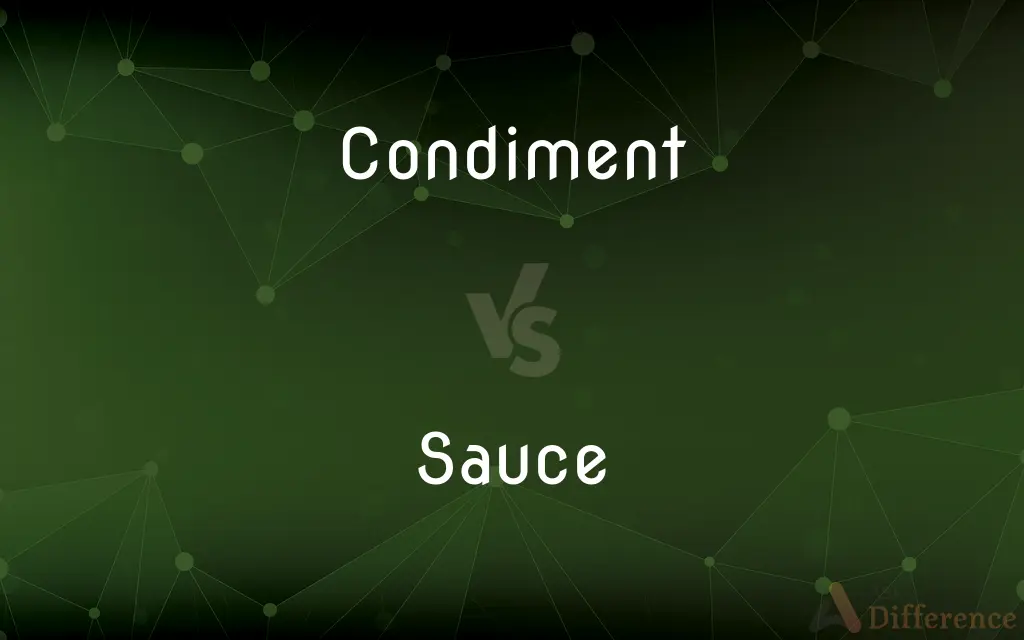Condiment vs. Sauce — What's the Difference?
By Tayyaba Rehman & Urooj Arif — Updated on April 8, 2024
Condiments are substances added to food to enhance flavor or complement a dish, including sauces, while sauces are specifically prepared liquids or semi-liquids that add moisture, flavor, or visual appeal to food.

Difference Between Condiment and Sauce
Table of Contents
ADVERTISEMENT
Key Differences
Condiments serve as an umbrella term that encompasses a wide range of flavor-enhancing substances, including but not limited to sauces, spices, and spreads. They are typically used in small amounts and added to food by the diner to taste, whereas sauces are a specific category within condiments that consist of a liquid or semi-liquid mixture used to add moisture, flavor, or aesthetic appeal to dishes. Sauces are often an integral part of the cooking process, prepared by the cook and served with the dish.
While condiments can be store-bought or homemade and include a variety of items such as ketchup, mustard, and relish, sauces can range from simple gravies to complex emulsions like hollandaise or bechamel. On the other hand, sauces often require more preparation and cooking, being carefully crafted to complement specific dishes, whether they are drizzled on top, used as a marinade, or served on the side for dipping.
Condiments are generally served on the side and allow individuals to tailor the taste of their meal to their personal preference. They can be as simple as salt and pepper or as complex as artisanal spreads. Meanwhile, sauces, due to their role in cooking, often contribute significantly to the dish's overall flavor profile and presentation, and their preparation can be a delicate balance of ingredients to achieve the desired taste and consistency.
The use of condiments is rooted in the preservation methods of ancient cuisines, where spices and seasonings were used to extend the shelf life of foods or mask off flavors. Sauces, however, have developed as culinary arts have advanced, with different cultures creating an array of sauces that reflect their unique ingredients and taste preferences.
In terms of variety, the world of condiments is vast and diverse, including everything from vinegars and oils to pickles and chutneys, reflecting a wide array of culinary traditions and preferences. Sauces, while also diverse, are more narrowly defined by their liquid or semi-liquid state and their role in complementing a dish rather than simply seasoning it.
ADVERTISEMENT
Comparison Chart
Definition
A substance added to food to enhance or complement its flavor.
A specific type of condiment, usually liquid or semi-liquid, used to add moisture, flavor, or visual appeal to a dish.
Examples
Ketchup, mustard, relish, mayonnaise, hot sauce.
Gravy, hollandaise, marinara, salsa, béchamel.
Preparation
Can be used directly from the container or prepared; varies widely.
Often requires cooking or blending of ingredients.
Usage
Added by the diner to taste; often served on the side.
Integrated into the cooking process or served with the dish.
Variety
Includes a broad range of substances beyond liquids, such as spices and spreads.
Primarily liquid or semi-liquid; variety comes from different culinary traditions and ingredients.
Compare with Definitions
Condiment
Flavor enhancers.
Salt is the most basic condiment, used to enhance the natural flavors of food.
Sauce
Culinary art.
Béchamel sauce is a fundamental element in French cuisine, used in dishes like lasagna.
Condiment
Cultural variety.
In India, chutney serves as a staple condiment, offering sweet or spicy flavors.
Sauce
Aesthetic appeal.
A drizzle of caramel sauce enhances the visual appeal and taste of desserts.
Condiment
Preservation origins.
Pickles, used as a condiment, originated as a way to preserve vegetables.
Sauce
Moisture and flavor.
Gravy, made from meat drippings, adds moisture and richness to mashed potatoes.
Condiment
Diverse forms.
Soy sauce, a popular condiment, adds umami to dishes.
Sauce
Cooking process.
Marinara sauce is simmered with herbs and tomatoes, becoming integral to pasta dishes.
Condiment
Personal taste.
Many people add hot sauce to their meals as a personal preference condiment.
Sauce
Complex preparation.
Hollandaise sauce, an emulsion of egg yolk and butter, requires careful preparation.
Condiment
A condiment is a spice, sauce, or preparation that is added to food, after cooking, to impart a specific flavor, to enhance the flavor, or to complement the dish. A table condiment or table sauce is more specifically a condiment that is served separately from the food and is added to taste by the diner.
Sauce
In cooking, a sauce is a liquid, cream, or semi-solid food, served on or used in preparing other foods. Most sauces are not normally consumed by themselves; they add flavor, moisture, and visual appeal to a dish.
Condiment
A substance, such as a relish, vinegar, or spice, used to flavor or complement food.
Sauce
A flavorful liquid or semisolid condiment or mixture of ingredients served as a topping or other accompaniment to food.
Condiment
Something used to enhance the flavor of food; for example, salt or pepper.
Sauce
Stewed fruit, usually served with other foods.
Condiment
(transitive) To season with condiments.
Sauce
Something that adds zest, flavor, or piquancy.
Condiment
(transitive) To pickle.
Sauce
(Informal) Impudent speech or behavior; impertinence or sauciness.
Condiment
Something used to give relish to food, and to gratify the taste; a pungment and appetizing substance, as pepper or mustard; seasoning.
As for radish and the like, they are for condiments, and not for nourishment.
Sauce
(Slang) Alcoholic liquor.
Condiment
A preparation (a sauce or relish or spice) to enhance flavor or enjoyment;
Mustard and ketchup are condiments
Sauce
To season or flavor with sauce.
Sauce
To add piquancy or zest to.
Sauce
(Informal) To be impertinent or impudent to.
Sauce
A liquid (often thickened) condiment or accompaniment to food.
Apple sauce; mint sauce
Sauce
Tomato sauce (similar to US tomato ketchup), as in:
[meat] pie and [tomato] sauce
Sauce
Alcohol, booze.
Maybe you should lay off the sauce.
Sauce
(bodybuilding) Anabolic steroids.
Sauce
(art) A soft crayon for use in stump drawing or in shading with the stump.
Sauce
(dated) Cheek; impertinence; backtalk; sass.
Sauce
Vegetables.
Sauce
Any garden vegetables eaten with meat.
Sauce
To add sauce to; to season.
Sauce
To cause to relish anything, as if with a sauce; to tickle or gratify, as the palate; to please; to stimulate.
Sauce
To make poignant; to give zest, flavour or interest to; to set off; to vary and render attractive.
Sauce
(colloquial) To treat with bitter, pert, or tart language; to be impudent or saucy to.
Sauce
(slang) To send or hand over.
Sauce
A composition of condiments and appetizing ingredients eaten with food as a relish; especially, a dressing for meat or fish or for puddings; as, mint sauce; sweet sauce, etc.
High sauces and rich spices fetched from the Indies.
Sauce
Any garden vegetables eaten with meat.
Roots, herbs, vine fruits, and salad flowers . . . they dish up various ways, and find them very delicious sauce to their meats, both roasted and boiled, fresh and salt.
Sauce
Stewed or preserved fruit eaten with other food as a relish; as, apple sauce, cranberry sauce, etc.
Sauce
Sauciness; impertinence.
Sauce
A soft crayon for use in stump drawing or in shading with the stump.
Sauce
To accompany with something intended to give a higher relish; to supply with appetizing condiments; to season; to flavor.
Sauce
To cause to relish anything, as if with a sauce; to tickle or gratify, as the palate; to please; to stimulate; hence, to cover, mingle, or dress, as if with sauce; to make an application to.
Earth, yield me roots;Who seeks for better of thee, sauce his palateWith thy most operant poison!
Sauce
To make poignant; to give zest, flavor or interest to; to set off; to vary and render attractive.
Then fell she to sauce her desires with threatenings.
Thou sayest his meat was sauced with thy upbraidings.
Sauce
To treat with bitter, pert, or tart language; to be impudent or saucy to.
I'll sauce her with bitter words.
Sauce
Flavorful relish or dressing or topping served as an accompaniment to food
Sauce
Behave saucy or impudently towards
Sauce
Dress (food) with a relish
Sauce
Add zest or flavor to, make more interesting;
Sauce the roast
Common Curiosities
Are all condiments liquid?
No, condiments include a variety of forms, from liquids like vinegar to solids like salt and spreads like mustard.
How are condiments used differently from sauces?
Condiments are generally added by individuals to their own serving to taste, while sauces are often part of the dish's preparation or presented alongside the dish as an integral component.
What role do condiments play in health and nutrition?
While condiments can enhance flavor, they should be used in moderation due to their potential high content of salt, sugar, or fat.
Can making a sauce be considered an art?
Yes, the creation of sauces can be highly complex, requiring knowledge of flavors and techniques, and is often considered an art in the culinary world.
Why are sauces important in cooking?
Sauces add moisture, enhance flavors, and contribute to the visual appeal of a dish, playing a crucial role in its overall taste and presentation.
How do cultural differences affect the use of condiments and sauces?
Different cultures have unique condiments and sauces that reflect their culinary traditions, ingredients, and taste preferences, leading to a vast global diversity.
What distinguishes a condiment from a sauce?
A condiment is a broad category that enhances or complements food flavor, including sauces, while a sauce is a specific type of condiment focused on adding moisture, flavor, or visual appeal to dishes.
Can a sauce be considered a condiment?
Yes, sauces fall under the broader category of condiments but are distinguished by their liquid or semi-liquid form and specific culinary uses.
How has the use of condiments evolved over time?
Originally used for preservation and masking off flavors, condiments have evolved to play a central role in culinary arts and enhancing food enjoyment.
Are there any universal condiments used worldwide?
While not universal, certain condiments like salt, pepper, and vinegar are widely used across many cultures due to their ability to enhance flavor.
Share Your Discovery

Previous Comparison
Lawyer vs. Jurist
Next Comparison
Sectoral vs. SectorialAuthor Spotlight
Written by
Tayyaba RehmanTayyaba Rehman is a distinguished writer, currently serving as a primary contributor to askdifference.com. As a researcher in semantics and etymology, Tayyaba's passion for the complexity of languages and their distinctions has found a perfect home on the platform. Tayyaba delves into the intricacies of language, distinguishing between commonly confused words and phrases, thereby providing clarity for readers worldwide.
Co-written by
Urooj ArifUrooj is a skilled content writer at Ask Difference, known for her exceptional ability to simplify complex topics into engaging and informative content. With a passion for research and a flair for clear, concise writing, she consistently delivers articles that resonate with our diverse audience.
















































